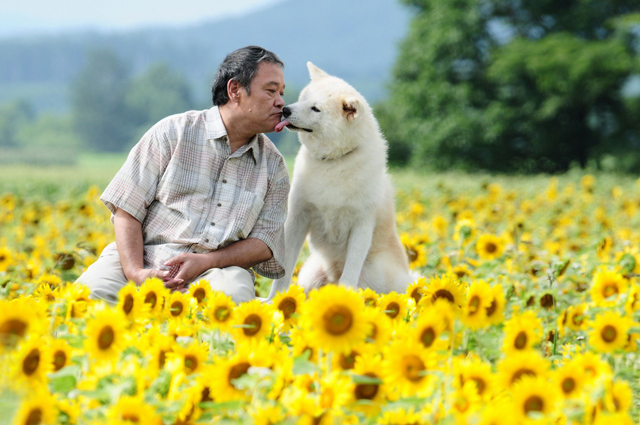The third day of the Japanese Film Festival was attacked from all sides, but featured two stalwarts of the nation’s cinematic output: the weepy dog story and the sugary tale of a pattissier in the making, more commonly recognised as “the chef’s journey”.
Star Watching Dog

Japanese films have a tendency of making up Japanese folklore where they feel necessary. Does the star watching dog exist? The idea goes that dogs watch the stars, not knowing they can never reach them. Therefore, they always aim for the top.
Japanese dogs never banked on Laika.
Okutsu is a loner who works for a local government agency. When a policeman discovers the body of a man and his dog in a van in the woods, Okutsu decides to take leave and figure out what the story behind the solemn scene is.
From the fact that the film opens with a dead man and his dog, you’ve every reason to expect weepiness. That’s exactly what Star Watching Dog offers; as the credits begin to roll, it’s difficult to hear the music over the sniffling in the audience.
The Okutsu storyline is an obvious framing device, and one that the movie needs so that it doesn’t become too depressing. This is a softly softly approach to several social issues in Japan stemming from the global financial crisis, general unemployment and a failure of communication between a married couple. The outcome for our never named hero is somewhat fatalistic, and watching an inexorable death march would have benefitted no one in this case. Okutsu asks us to take heart in what the dead man could get out of his life.
True, this sort of optimism is misplaced when you consider that society uniformly failed the man in the van, but sometimes lessons have to be learned. Parts of the framing don’t make much sense, such as the runaway sidekick that tags along with Okutsu and eventually decides to go home despite the fact that she’s been beaten by her drunken stepfather and her mother’s too lovesick to care or to notice. Towards the end, we lose most of the device as Okutsu’s trail runs cold. We end up knowing more about the man than any interview could have told him. He remains a mystery to all but the audience, but still everyone understands the depth of love that a man and his dog can have for one another.
This movie thrives on Nishida Toshiyuki, in his third role of the festival. There is nothing bad about his character, and he completely sells his affability. The film is beautifully shot and, while the baggage is excess it’s needed to make the tone lighter; to make the sadness less consuming and depressing. Perhaps that’s a copout: perhaps this film should have been about how friendship and niceness can still leave you for dead. But it’s not. It’s a lesson of a film, and we all stand to profit from it.
On sheer emotional response, this is the film of the festival so far.
Patisserie: Coin de Rue

The Japanese Film Festival had its first major hiccup in the screening of Patisserie: they couldn’t get the sound to work and the screening was delayed by forty minutes. Then the ads for the next session came on during the climactic scenes, and by the time vision was restored, all conflict in the film had been resolved. Fortunately the movie managed to rise above its setbacks, but only just.
This is, after all, this year’s sport movie, in lieu of an actual sport movie.
Nature comes to Tokyo in search of her boyfriend only to find that he’s already deserted the patisserie he was supposed to work in. After several gear shifts, Natsume decides both to work in the patisserie and to become the greatest pâtissière ever. There’s a parallel storyline about Tomura, a critic who used to be a master himself, but that is accessed through Natsume and excessively repetitive flashbacks.
Aoi Yu has, since her humble Japanese Film Festival beginnings in the less than good film adaptation of Honey & Clover, become something of a stalwart in the genre of can do girls. Here she wields a killer accent and a stubbornness that inevitably translates to success, given time and effort. Which is the strange thing, because almost all of the time and effort is invested offscreen, and we don’t get to see it either by montage or by other means. When an elderly woman asks “when did she get so good at making cakes?” I asked myself the same question.
Giving such a light touch to the legitimate effort put in by the lead character, yet repeatedly drilling in the personal tragedy that shaped Tomura, is a strange and imbalanced move. Recipes only work if all of the steps are followed in order, and director Fukagawa takes a few too many shortcuts. You’d expect this kind of movie to compensate with excessive shots of delicious looking confectioneries, but it is mercilessly light in that department.
Despite key ingredients missing – and me having no idea how the film’s final argument panned out or was resolved – Patisserie: Coin de Rue does manage to hit just enough right notes to scrape over the edge. When you work to a formula, as so many Japanese films do, it’s sometimes possible to make a film greater than its parts. It’s hard to single out much to praise in this somewhat ramshackle film, but it’s sweet and enjoyable nonetheless.
